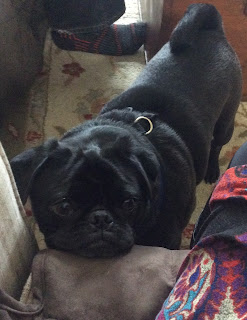When I get myself stuck in the overeating mode, my brain settles happily into a cove of negativity. It love — and I mean, really really loves — to focus and refocus on everything that stirs up negative thoughts.
I could and often did spend an entire night (sugary snacks in hand) roaming around my house of resentments and disappointments:
— Remember how much your father messed up your life by making you believe you were unlikeable? By showing so clearly how much he preferred your sister and thought you were too awkward and too smart? Telling people things like how he can’t imagine you ever getting married?
— Remember those girls in junior high who singled you out and teased and bullied you for months? And no teachers ever stepped in to help even though you had no idea what to do about it?
— Remember how when you got engaged, both you and your fiancé were in really bad places work-wise and finance-wise, so you never got an engagement ring? Everyone else you know who is married has a pretty diamond ring, but you don’t get to have one.
I’m really really good at finding things to get my brain all wound up with unhappiness and despair. Like, really good at it. And my mind loves to schmooze around in negativity.
I know, I know, it’s an evolutionary things and we’re probably hard-wired to pay attention to the negative. Wolf coming to your campfire? Better be prepared for it.
But of course, in today’s world, all that negative focus can be tremendously hurtful. If I ever hope to get myself out of my overeating, I have to got to get my brain to stop focusing so obsessively on the negative.
I believe the research that gratitudes are really useful in rewiring the brain. But gratitudes have become rote with me — lately I’ve just been jotting down “pretty trees,” “warm house,” “nice complement”. I want to take more time with them and really soak up the gratitude daily.
I know that’s the best way to get my mind out of its usual negative-nelly, “let’s review everything wrong with your life right now” mindset.
Gratitudes:
1. Trees and branches covered with a light dusting of snow are breathtakingly beautiful.
2. At the coldest time of winter, with real-feel temps at 15 below, I have a cozy house with a working furnace that keep me warm and comfortable. I am immensely fortunate to have a warm, safe, comfortable house.
3. Someone told me yesterday that I was so good a public speaker that I could read the phone book and people would come out to hear me. Complements make me very uncomfortable (putting this out here for all of you to read is making me cringe and worry that you’ll think I’m a big diva). But since my brain likes to focus way too much on what I do wrong in work than what I do right, I paid attention to accepting the complement with a grateful heart. I am deeply grateful for having found work that I genuinely enjoy and that I do well.
People in AA sometimes say that “grateful heart don’t drink.” It works just as well for over eaters. Grateful hearts don’t eat.











